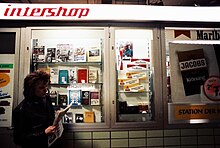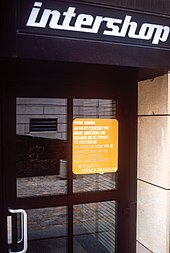Intershop (trade)
| Intershop GmbH
|
|
|---|---|
| legal form | Company with limited liability |
| founding | December 14, 1962 |
| resolution | 1990 |
| Reason for dissolution | Dissolution in the course of German reunification |
| Seat | German Democratic Republic |
| Branch | Trading company |
Intershop was a retail chain in the GDR whose goods could only be paid for with convertible currencies , later also with forum checks , but not with GDR marks . An unavoidable side effect was that the normal GDR citizen got a limited insight into the range of goods in the West. According to historian Matthias Judt, the forerunner names for the Intershop were the transit warehouse and the international bazaar .
history
On December 14, 1962, the state trade organization "Intershop GmbH" was founded in the GDR by representatives of Mitropa and Deutsche Genußmittel GmbH . This should skim off the freely convertible currencies ( foreign exchange , valuta ) in circulation in the GDR . Initially, the target group were transit travelers and visitors from western countries . The first still mobile sales booths were used in East Berlin in Friedrichstrasse station. Here mainly cigarettes were sold at a much lower price than in West Berlin . Gradually, alcoholic beverages and other goods were added. In 1962 a million DM was turned over.
Initially, the Intershop trade was organized by Mitropa . With the establishment of the first Interhotels , a so-called “room service” was introduced there. This was usually housed in a hotel room and was intended to encourage people to spend foreign currency on the spot. Little by little, these businesses grew.
Intershops were later set up at border crossing points , rest areas on the transit routes between the Federal Republic of Germany and West Berlin (Inter-Tank) and at train stations, airports and ferry ports. You could pay with any freely convertible currency, especially Westmark (DM). The range included food, alcohol, tobacco products, clothing, toys, jewelry, cosmetics, technical devices, sound carriers and much more. There were these products in the GDR for the official currency of the GDR mark only occasionally to buy or not, although most of the goods offered in connection with the licensed production was produced in East Germany for West Company. The “forum Außenhandelsgesellschaft mbH” with 900 employees, part of the commercial coordination department, was responsible for supplying the Intershop stores with goods .
Until 1974, citizens of the GDR were officially forbidden to own currency (see Westgeld ). This ban was lifted by a decree of the Council of Ministers of the GDR , and GDR citizens have since been allowed to shop in most Intershops. The so-called "transit shops" located at motorway service stations - some with self-service - were still only accessible to travelers from the " non-socialist economic area ", which is why travel documents had to be shown at the entrances. In addition, the offer consisted of duty-free goods (cigarettes, spirits, coffee and perfume) as well as branded clothing, watches and jewelry. The sales prices for these goods were well below the price level in the Federal Republic of Germany and West Berlin, while Intershop prices for the goods, which were particularly popular with GDR citizens, were relatively high. GDR citizens could not legally exchange the GDR mark for foreign currency. Only value date gifts from relatives from western countries or wages for activities in western countries, which were proportionally paid in value date, were legal. In 1974 there were 271 Intershops. Since this is an ideological problem, State Council Chairman Erich Honecker commented on Intershops in 1977:
“These shops are of course not a constant companion of socialism. But we cannot ignore the fact that the large flow of visitors in particular brings much more foreign currency among the people than was previously the case. As is well known, around 9.5 million guests from capitalist countries come to us each year, who eat with us, mostly spend the night and of course have money in their pockets. Through the Intershop stores, we have created the possibility that these currencies remain with us in the country. "

From April 16, 1979, GDR citizens had to exchange their currency at the GDR State Bank for forum checks in order to continue shopping in the Intershop . Western foreigners continued to pay in Western money. One forum check mark corresponded to one DM, the smallest denomination being 50 forum check pfennigs. Smaller amounts were usually reimbursed in the form of chocolate tablets or lollipops of 10 pfennigs when paying with forum checks.
In the 1980s there were 380 branches, with sales in the billions. Since 1962 the last 300 branches of Exquisit (for high-quality clothing / shoes / cosmetics) and since 1976 550 shops of Delikat (for high-quality food / delicatessen ) have been set up in the GDR . They also gave citizens of the GDR without West money access to high-quality goods in order to siphon off purchasing power . In 1988 there were 416 shops.
The Ministry for State Security (MfS) monitored the Intershops very closely. Often relatives of MfS employees or officials worked in sales. In some cases surveillance cameras were also used; at first even the passports were checked. The transport of goods was also well secured. Nevertheless, there were numerous thefts and some partly armed robberies at Intershop branches. In addition to the People's Police , the MfS was always involved in the investigation . It was found that branch managers and employees were often among the perpetrators. Therefore, since the 1980s, part of the wages was paid out to the sales staff in Westgeld. Tips had to be paid according to fixed rules.
Since you were not allowed to take photos in the Intershop, there are very few photos of the interior of the shops. Most of them come from the MfS. The West German photographer Günter Schneider created numerous photos of Intershop stores as part of a larger report on the transit routes.
According to the tax laws of the Federal Republic of Germany, tax-free shopping in Intershops was only legal for citizens of the Federal Republic of Germany and Berlin (West) if they had entered the GDR. Customers of the Intershop at the Friedrichstrasse subway station , which was accessible from the West Berlin subway network without a border crossing, were therefore often stopped by western customs officers when they returned to West Berlin and had to pay the evaded sales tax .
Financial balance sheet
When the forum checks were introduced in 1979, sales in the Intershop fell to 774 million euros (1978: 896 million euros). From 1985 onwards, more than one billion D-Marks were turned over annually. For comparison: the GDR's foreign debts amounted to 26.5 billion US dollars at the end of the 1980s - this sum was offset by own assets and claims of 15.7 billion US dollars. The KoKo empire , headed by Alexander Schalck-Golodkowski , to which the Intershop chain also belonged, earned a considerable share of this .
Branches
| year | Intershops |
|---|---|
| 1977 | 271 |
| 1988 | 416 |
| 1989 | 470 |
Similar business
- Genex (mail order) - GDR
- Baltona - VR Poland
- Pewex - VR Poland
- Tuzex - ČSSR
- Corecom - VR Bulgaria
- Beryoska - USSR
- Friendship Shop - PRC
literature
- Andreas Dunte: Shopping like in the west . P. 3 in the Leipziger Volkszeitung from March 1, 2014 ( PDF; 78.7 kB )
- Matthias Judt in an interview: "Economy wins over principles" . P. 3 in the Leipziger Volkszeitung from March 1, 2014
Web links
- The Intershop in the GDR, documentary, MDR on YouTube
- Original invoice from the Intershop in the collection of the DDR Museum Berlin
Individual evidence
- ↑ a b Andreas Dunte: Shopping like in the west . In: Leipziger Volkszeitung , p. 3 of March 1, 2014 ( PDF; 78.7 kB ).
- ^ A b Moritz Honert: Gregor Gysi, Heike Drechsler and the Intershop. In: Tagesspiegel. October 3, 2015, accessed March 9, 2017 .
- ↑ a b Michael Ossenkopp: GDR stores for D-Mark and dollar - the wide world in the Intershop. In: Mitteldeutsche Zeitung. July 12, 2012. Retrieved March 9, 2017 .
- ^ Friedrich Christian Delius , Peter Joachim Lapp : Transit Westberlin. Experiences in between . 2nd edition Links-Verlag, Berlin 2000, ISBN 3-86153-198-4 .
- ↑ Intershop: The GDR's Greed for D-Mark. ndr.de, February 11, 2014, accessed March 9, 2017 .





